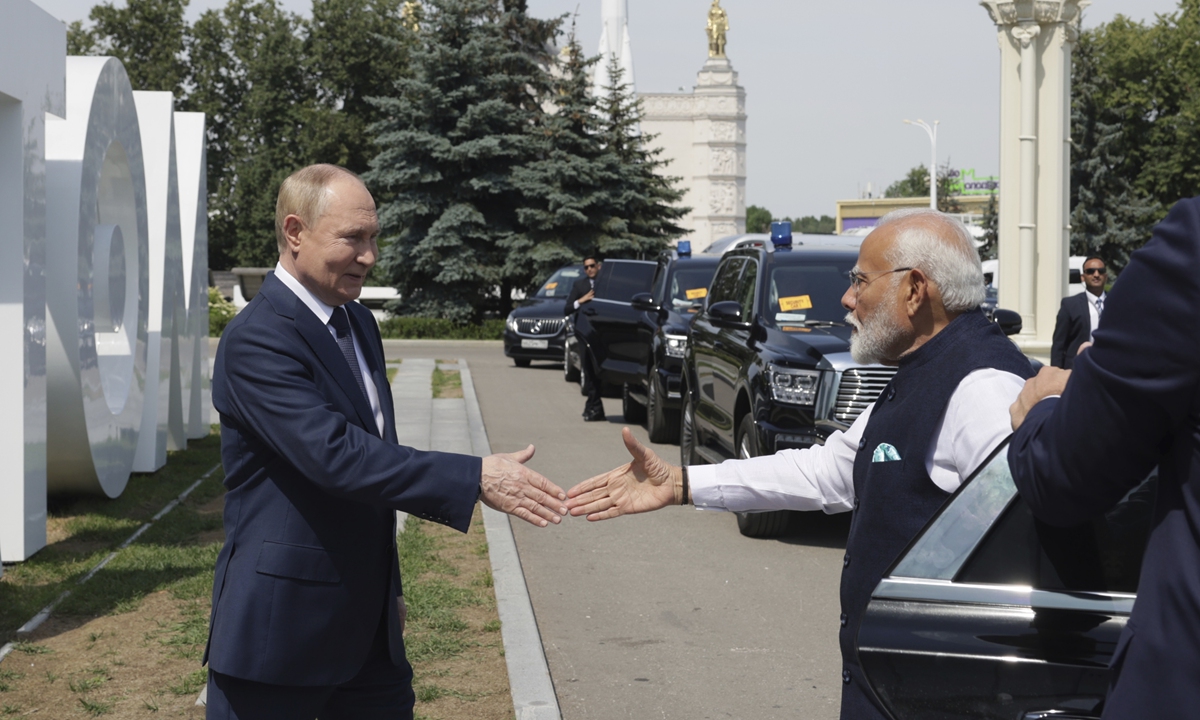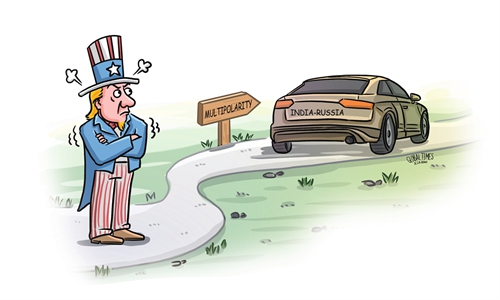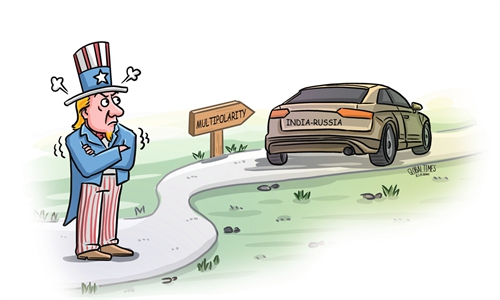Modi, Putin deepen ties in Moscow, 'frustrating US efforts to contain, isolate Russia'

Russian President Vladimir Putin and Indian Prime Minister Narendra Modi tour the Atom Pavilion, a permanent exhibition center at the All-Russia Exhibition Centre in Moscow on July 9, 2024. Photo: VCG
The US expressed its "concerns" toward India about its relationship with Russia, as Indian Prime Minister Narendra Modi visited Moscow during which the India-Russia friendship has been highlighted by Modi and Russian President Vladimir Putin.Analysts said that closer relations between Russia and India mean that the US' ceaseless effort of containing and isolating Russia since the Ukraine crisis began is frustrated. Meanwhile, India's balanced diplomacy is not only in line with its own interests but also contributes to a global strategic balance which has long been challenged by US hegemony.
Modi started his two-day visit to Russia on Monday with a warm reception from Putin before the two leaders engaged in official talks at the Kremlin on Tuesday. According to media reports, Putin embraced Modi at his home at Novo-Ogaryovo, offering Modi tea, berries and sweets and took him on a tour of the grounds in a motorized cart.
"To visit a friend's home is a great pleasure," Modi said on Monday, per a report from Russian news agency TASS. Modi also posted pictures in X upon his arrival in Moscow, in both English and Russian, saying that stronger ties between India and Russia "will greatly benefit our people."
In an X post on Tuesday, Modi said talks between two leaders "will surely go a long way in further cementing the bonds of friendship between India and Russia." Modi also shared pictures of himself hugging and shaking hands with Putin.
Despite Kremlin spokesman Dmitry Peskov saying that "no joint communication with the media is foreseen" in terms of Tuesday's official talks, TASS said the Putin-Modi meeting is expected to focus on trade, the economy and issues of "regional and global significance," which analysts interpreted as energy cooperation and the Ukraine crisis.
In response to Modi's visit, US State Department spokesperson Matthew Miller said at a press briefing on Monday (local time) that the US government "has made quite clear directly with India our concerns about their relationship with Russia," and hope India would make clear that Russia should respect the UN Charter, should respect Ukraine's sovereignty and territorial integrity when they engage with Russia.
Modi's Russia visit illustrates India's balancing of foreign policy between major powers, Li Haidong, a professor at China Foreign Affairs University, told the Global Times.
According to the expert, the biggest challenge in the current geopolitical landscape is US hegemony which enables Washington to act arbitrarily and unrestrained.
The deepening of relations between Russia and India is an important step toward global strategic balance, Li said. "Modi's interaction with Putin in Russia can be regarded as positive as long as it helps ease the Russia-Ukraine conflict, makes stability in Europe more promising, and makes major power relations more balanced," he said.
The visit comes just ahead of the NATO summit in Washington, a gathering widely regarded as targeting Russia.
Despite a lavish reception for Modi in the US during his state visit to US last year, it is clear that India is not falling for America's attempt to coax it into confronting Russia, Li said.
India, a major power with a tradition of strategic autonomy, is well aware of the falsities of US diplomacy, Li said. "The US-India relationship is one that each gets what it needs. India has been pragmatic in contrast to America's wishful wooing," he said.
According to media reports, India has refused to join Western sanctions against Russia after the Ukraine crisis, instead turning to Russia for discounted energy imports, with more than 40 percent of its oil imports from Russia. Meanwhile, Russia is still a key military equipment supplier to India.
"The closer relationship between India and Russia shows the failure of the US' strategy to contain and isolate Russia… it means a deep frustration for the elites in Washington," said Li.
Analysts said that no matter who takes office in the White House a few months later, India's Russia policy will remain consistent, in other words, India is unlikely to completely follow the US and isolate Russia.



